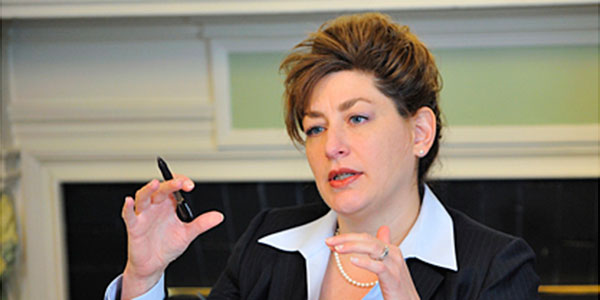
Less than a week after promising a significant expansion at the University of Connecticut”™s Stamford campus, UConn President Susan Herbst quickly tempered any sky-high expectations in describing Stamford an outlying campus that would focus on a few niche specialties.
Herbst spoke in mid-June at the annual meeting of the Business Council of Fairfield County. She cited several academic fields for which Stamford offers particular potential, including entrepreneurship, digital media and hospitality.
“I think there has been a deficit of our attention to Fairfield County,” Herbst said. “We have to make up for that.”
Herbst said UConn has approached developers about potentially building housing for students, while saying no formal request for proposals have yet to go out.
A week later on WNPR”™s “Where We Live” radio show, however, Herbst termed Stamford “a remote campus” in the context of a comparison with the universal subjects offered in Storrs, and pointed out cautionary tales of universities spreading themselves too thin.
“We can”™t start to dissipate all of our resources across campuses,” Herbst told WNPR. “None of the campuses except Storrs are to be full service. They need to have particular brands and niches. At Stamford we”™re building hard in business, in digital media. We”™ve got a lot of majors there, but no you”™re not going to be able to do everything at Stamford.
“We don”™t do (maritime studies) well at Storrs because we do that so well at Avery Point,” Herbst said. “I”™d say the same thing is going to be true about digital media; certainly for some of the business executive programs in Stamford. So you know, people do have to make their choices and we”™re limited as an institution in what we can offer.”
In late June, UConn”™s board of trustees approved a $1.9 billion budget, including $825 million for the UConn Health Center in Farmington that has dominated headlines in the past year following The Jackson Laboratory”™s agreement to build an affiliated genomics lab with as many as 300 researchers.
UConn is hiking tuition, with Herbst saying it remains in line with peer institutions. Behind the scenes the school hired McKinsey & Co. to help the school leverage any areas it can to find savings, through centralization and other mechanisms.
“We did not let McKinsey go on the academic side,” Herbst said. “They were to look at facilities, procurement, athletics, fundraising.”
In Stamford, Herbst pointed out UConn”™s relatively small endowment as an area of particular focus in her early tenure with the school.
At the same time, UConn is in the process of hiring 290 new faculty members over the coming four years across its campuses in a bid to further elevate its research capabilities and by extension its profile. The initial big push will come in the school of arts and sciences ”“ Herbst pointed out the case of the University of Virginia where Tudor Investment Corp. founder Paul Tudor Jones backed the ouster of the president on grounds of lower enrollment and overall performance ”“ a decision subsequently reversed ”“saying UConn would not back away from supporting niche programs that do not draw hordes of students.
Herbst told WNPR that UConn”™s challenges echo those seen at many research universities across the country.
“I don”™t know that we always aim high enough ”“ whether it”™s with regard to what we want or expect with students in the classroom, all the way to things like grant applications and fundraising,” Herbst said. “That said, there are tremendous pockets of great ambition at UConn. I was at Northwestern a long time, and I think many parts of the university look just like a top university like that; and others are more fearful. Remember that some of them have been cut very badly and have been resource-starved. And when you are starved for resources, it brings down your expectations about what you can and should be.”



















